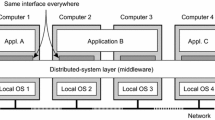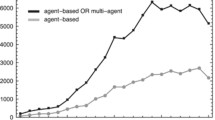Abstract
Mobile agent technology has been applied to develop the solutions for various kinds of parallel and distributed computing problems. However, performance evaluation of mobile agent algorithms remains a difficult task, mainly due to the characteristics of mobile agents such as distributed and asynchronous execution, autonomy and mobility. This paper proposes a general approach based on direct execution simulation for evaluating the performance of mobile agent algorithms by collecting and analyzing the information about the agents during their execution. We describe the proposed generic simulation model, named MADES, the architecture of a software environment based on MADES, and a prototype implementation. A mobile agent-based distributed load balancing algorithm has been used for experiments with the prototype.
Similar content being viewed by others
References
J. Cao, G. Bennett, and K. Zhang. Direct execution simulation of load balancing algorithms with realworkload distribution. The Journal of Systems and Software, 54:227-237, 2000.
J. Cao and M. Pole. A software environment for simulating distributed task-scheduling algorithms. Software-Concepts and Tools 18:125-136, 1997.
J. Cao, X. Wang, and S. K. Das. A framework of using cooperating mobile agents to achieve load balancing in distributed web server groups. Proc. 5th International Conference on Algorithms and Architectures for Parallel Processing (ICA3PP2002), IEEE Computer Society Press, Oct. 2002.
P. M. Dickens, P. Heidelberger, and D. M. Nicol. Parallelized direct execution simulation of messasge-passing parallel programs. IEEE Transactions on Parallel and Distributed Systems, 7(10):1090-1105, 1996.
M. D. Dikaiakos and G. Samaras. Quantitative performance analysis of mobile agent systems: A hierarchical approach. Technical Report TR-00-02, Department of Comuter Science, University of Cyprus, June 2000.
M. D. Dikaiakos and G. Samaras. Performance evaluation of mobile agents: Issues and approaches. Performance Engineering, LNCS 2047:148-166, 2001.
O. Etzioni and D. S. Weld. Intelligent agents on the internet: Fact, fiction, and forecast. IEEE Expert, 10(3):44- 49, 1995.
G. Franks, S. Majumdar, J. Neilson, and D. Petriu. Performance analysis of distributed server systems. Proc. of The 6-th International Conference on Software Quality, pp. 15-26, October 1996.
A. Gupta and V. Kumar. Performance properties of large scale parallel systems. Journal of Parallel and Distributed Computing, 19(3):234-244, 1993.
L. Ismail and D. Hagimont. A performance evaluation of the mobile agent paradigm. Conference on Object-Oriented, 1999, pp. 306-313.
S.-H. Kim and T. G. Robertazzi. Mobile agent modeling. Technical Report, University at Stony Brook, College of Engineering and Applied Science, Nov. 2000, No. 786.
O. de Kretser, A. Moffat, T. Shimmin, and J. Zobel. Methodologies for distributed information retrieval. Proc. of the Eighteenth Int'l Conference on Distributed Computing Systems, pp. 26-29, May 1998.
A. Lingnau and O. Drobink. Simulating mobile agent systems with swarm. First International Symposium on Agent Systems and Applications Third International Symposium on Mobile Agents, Oct. 1999.
B. Meyer, M. Heineken, and C. Popien. Performance analysis of distributed applications with ANSAmon. International Conference on Open Distributed Processing (ICODP' 95), pp. 293-304.
B. Mohr. SIMPLE: A performance evaluation tool environment for parallel and distributed systems. 2nd European Conference, EDMCC2, LNCS 487, Springer, Berlin, April 1991, pp. 80-89.
B. Pagurek, Y. Wang, and T. White. Integration of mobile agents with SNMP: Why and how. NOMS'2000, 2000.
V. S. Pai, P. Ranganathan, and S.V. Adve. RSIM. An execution-driven simulator for ILP-based shared-memory multiprocessors and uniprocessors, IEEE TCCA Nesletter, Oct. 1997.
A. Puliafito, S. Riccobene, and M. Scarpa. An analytical comparison of the client-server, remote evaluation and mobile agents paradigms. First International Symposium on Agent Systems and Applications Third International Symposium on Mobile Agents, Oct. 1999, p. 278.
L. M. Silva, V. Batista, P. Martins, and G. Soares. Using mobile agents for parallel processing. International Symposium on Distributed Objects and Applications, Sept. 1999.
A. M. Uhrmacher, P. Tyschler, and D. Tyschler.Modeling and simulation of mobile agents. Future Generation Computer Systems, 2000, pp. 107-118.
S. Zhou. A trace-driven simulation study of dynamic load balancing. IEEE Transaction on Software Engineering, 14(9):1327-1341, 1988.
Author information
Authors and Affiliations
Rights and permissions
About this article
Cite this article
Li, X., Cao, J. & He, Y. A Direct Execution Approach to Simulating Mobile Agent Algorithms. The Journal of Supercomputing 29, 171–184 (2004). https://doi.org/10.1023/B:SUPE.0000026849.98610.e4
Issue Date:
DOI: https://doi.org/10.1023/B:SUPE.0000026849.98610.e4




